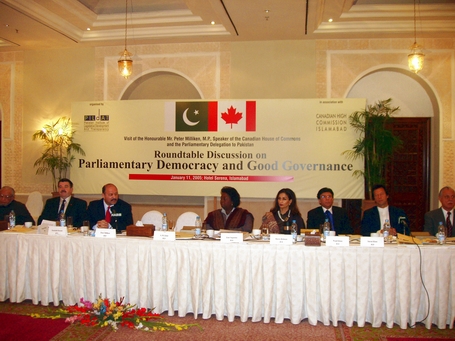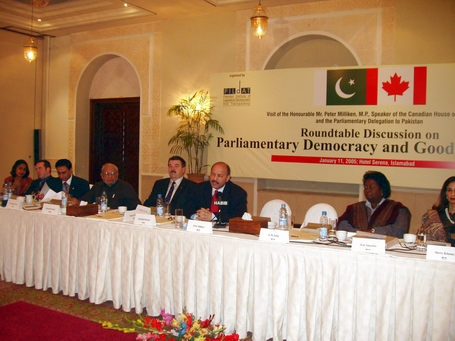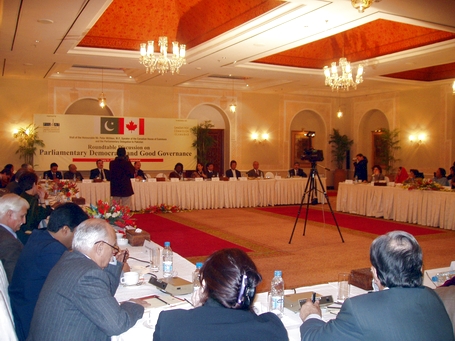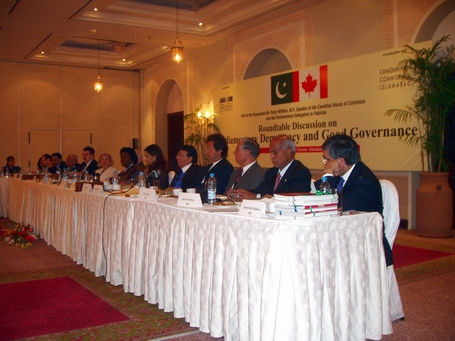|
|
| |
| EVENTS |
|
|
> Parliamentary Democracy and Good Governance
|
|
|
| |
|
PILDAT-Pakistan Institute of Legislative Development and
Transparency, in association with the Canadian High Commission at Islamabad,
held a Roundtable Discussion in honour of the Speaker of the Canadian House
of Commons on January 11, 2005 at Hotel Serena, Islamabad. A delegation of
Canadian Members of Parliament led by the Honourable Speaker is visiting
Pakistan. Members of the Canadian Delegation include the Honourable Speaker,
Mr. Peter Milliken, Ms Jean Augustine, M.P, Mr. Gurmant Grewal, M.P, Mr.
Wajid Khan, M.P., and Mr. Sebastien Gagnon, M.P. PILDAT wanted to use this
opportunity to discuss issues of mutual importance and enable Pakistani
Legislators to benefit from Canada�s parliamentary practices relating to
good governance. H.E Ms Margaret Huber, the High Commissioner of Canada
also attended the Roundtable Discussion. |
| |
|
Speakers at the Discussion included the Speaker of the
Canadian House of Commons, Mr. Peter Milliken, Deputy Speaker Ms Jean
Augustine, Ms Sherry Rehman, MNA, Mr. Imran Khan, MNA, Senator Mushahid
Hussain Sayed, and Senator Prof. Khurshid Ahmed. The Roundtable was attended
by H.E Ms Margaret Huber, the High Commissioner of Canada, Senator S.M Zafar,
Mr. Ashraf Choudhary, Member of Parliament New Zealand amongst approximately
40 discussants, including parliamentarians and other civil society
representatives. Members of the Canadian Delegation included the Honourable
Speaker, Mr. Peter Milliken, Ms Jean Augustine, M.P, Mr. Gurmant Grewal, M.P,
Mr. Wajid Khan, M.P., and Mr. Sebastien Gagnon, M.P. The roundtable
discussion was conducted in order to exchange information and views on
Parliamentary practices and good governance. |
| |
|
Some of the broad conclusions of the roundtable were as
follows: |
| |
-
Accountability and Transparency are crucial features in
a parliamentary democracy which need to be strengthened in order to ensure
good governance in Pakistan.
-
Politics of inclusion through providing equal
opportunities to all groups is the key to good governance.
|
| |
|
Talking at the roundtable, Ms Sherry Rehman stated that
there were a number of dissonances in Pakistan�s political system which were
undermining democracy and as a result the governance system. According to
her these included the conflict between the federal government and provinces
and provinces and local governments. She said that Pakistan lacked an
accountable, participatory political system which undermined prospects for
good governance. In his speech, Mr. Imran Khan said that nothing destroys
democracy more than a military dictatorship trying to legitimise itself
through a democratic fa�ade. According to him General Musharraf�s rule has
destroyed every democratic institution in Pakistan, including the Election
Commission, the Judiciary, and the Parliament. Senator Mushahid Hussain
Sayed said that Pakistan has a well established culture of dissent and a
strong democratic ethos. He said we have a vibrant media and civil society,
which are important components of a free democratic society. He added the
debate on Kashmir is far more open in Pakistan than it is in India. Senator
Professor Khurshid Ahmed was of the view that Canada represented a
successful model of accommodating the diversity of its population. He said
that the Canadian experience provides ample guidance for Pakistan. |
| |
|
In her comments, Ms Jean Augustine, Deputy Speaker of the
Canadian House of Commons said that the accountability and transparency were
crucial features of the Canadian political system. She said Canada practised
politics of inclusion in terms of age, religion and ethnic background. |
| |
|
Talking about parliamentary practices in Canada, Mr.
Peter Milliken said that the House of Commons has a parliamentary calendar,
which is adopted in the fall of the previous year. He said that the Canadian
Parliament was scheduled to meet for 133 working days in 2005. He stated
that working hours of the House were from 10:00 am to 7:00 pm. The Speaker
explained that committees in Canada played a crucial role in legislation and
oversight of the Executive. He said that four committees in the Canadian
Parliament were required to have members of the opposition as chairpersons. |
| |
|
Talking about parliamentary practices in Canada, Mr.
Peter Milliken said that the House of Commons has a parliamentary calendar,
which is adopted in the fall of the previous year. He said that the Canadian
Parliament was scheduled to meet for 133 working days in 2005. He stated
that working hours of the House were from 10:00 am to 7:00 pm. The Speaker
explained that committees in Canada played a crucial role in legislation and
oversight of the Executive. He said that four committees in the Canadian
Parliament were required to have members of the opposition as chairpersons.
Earlier, Mr. Ahmed Bilal Mehboob, Executive Director PILDAT, initiated the
roundtable discussion by welcoming the speakers and participants. He also
threw light on the background paper produced by PILDAT on the comparison of
Pakistani and Canadian Parliamentary systems with respect to good
governance. The roundtable concluded with the address of Dr. Ashraf Chaudhry,
Member of New Zealand Parliament, who is also a member of the
PILDAT-initiated International Network of Legislators of Pakistani Origin �
INLPO. Mr. Wajid Khan, Canadian MP of Pakistani origin is also a member of
INLPO. Ms. Margaret Huber thanked participants at the end for their valuable
time and interaction at the end on behalf of Canadian High Commission. |
|
|
| |
|
|
| |
|
|
| |
|
|
| |
|
|
| |
|
|
| |
|
|
| |
|
|
| |
|
|
| |
|
|
| |

|
|
| |
|
|
| |

|
|
| |
|
|
| |

|
|
| |
|
|
| |

|
|
|
|
|
|
|
|
|